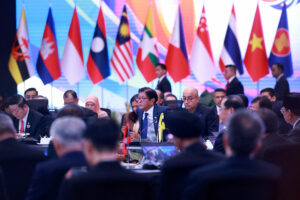By Chloe Mari A. Hufana, Reporter
PRESIDENT Ferdinand R. Marcos, Jr., who is set to deliver his fourth State of the Nation Address on July 28, is expected to use the remainder of his term cementing a foreign policy legacy defined by two pillars: promoting an independent foreign policy while pivoting towards both traditional allies and emerging partners, an analyst said over the weekend.
As geopolitical competition between the United States and China intensifies, Southeast Asian nations are under growing pressure to choose sides, but Manila is signaling that it intends to chart its course, said diplomacy lecturer at De La Salle-College of St. Benilde Josue Raphael J. Cortez.
“A lot of scholars today are arguing that Southeast Asia is in the middle of the great power competition, trying to hedge between the US and China,” he said in a Facebook Messenger chat. “The Philippines has shown that it can be a formidable friend to both parties.”
In the remaining three years of his six-year term, Mr. Marcos is expected to accelerate efforts to forge new partnerships beyond the country’s long-standing allies.
Hedging will remain a central feature of Philippine foreign policy under Mr. Marcos, as the country seeks to maximize its strategic value without becoming overly dependent on any single power bloc, Mr. Cortez noted.
Talks are underway to expand security and economic cooperation with Canada and European nations such as Lithuania, while Manila maintains strategic dialogues with South Korea and India to diversify its defense portfolio.
This dual-track approach reflects the constitutional mandate under Article II, Section 7, for an “independent foreign policy,” a principle the President has repeatedly invoked in public statements and regional fora.
Under Mr. Marcos’ leadership, Manila is set to chair the Association of Southeast Asian Nations (ASEAN) in 2026 and is also pursuing a non-permanent seat on the United Nations Security Council (UNSC) for 2027.
“Our campaign pitch for the UNSC seat says it so well: Partner, Pathfinder, and Peacemaker. Through this pitch, we can already see what the Marcos foreign policy agenda is about, both in the regional and global landscapes,” he noted.
As part of the country’s campaign for a non-permanent seat in the UNSC, Mr. Marcos reassigned his now Foreign Affairs Secretary Enrique A. Manalo to the UN in New York, who will be succeeded by veteran diplomat for bilateral relations, Ma. Theresa P. Lazaro.
In the second half of the Marcos administration, Mr. Cortez hopes the government will keep the country’s momentum in adhering to the 2016 Permanent Court of Arbitration ruling in favor of the country in the disputed region in the South China Sea.
“The Philippines may further increase its legitimacy by utilizing this circumstance as an example for nation-states across the world on how we can promote territorial integrity sans the use of force,” he added.
He said the Philippines could position itself as a model for ASEAN and other Global South countries by demonstrating how emerging technologies can be integrated without displacing workers, given its current stage of technological development compared to major powers like the US, China, and the European Union.
He also noted that strengthening the creative industries could boost the country’s soft power, showcasing Filipino adaptability and cultural heritage, similar to how Thailand and Indonesia leverage their cultural sectors.
According to Francis M. Esteban, faculty member at the Far Eastern University Department of International Studies, Mr. Marcos’ foreign policy in the past three years largely centered on preserving the country’s traditional Western allies rather than reorienting towards regional powers such as China.
He noted this may be a result of the President’s Western-oriented upbringing and a possible continuation of his late father’s favorable perspective on the West.
A key milestone under Mr. Marcos’ administration has been the enactment of the Philippine Maritime Zones Act, Mr. Esteban noted, which effectively incorporated the country’s 2016 arbitral victory against China into domestic law.
“As the chair of ASEAN next year and as a bid at the UNSC, it is an instrumental piece of legislation that encapsulates the Philippines as champion of a rules-based order,” he said in a Facebook Messenger chat.
However, enhancing protection mechanisms and diplomatic support for the country’s migrant workforce remains an area for potential action by the current or next administration, he said.
There were 2.16 million overseas Filipino workers (OFWs) in the last quarter of 2023, the Philippine Statistics Authority said.

